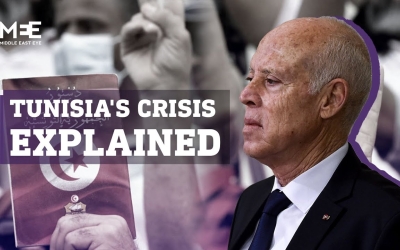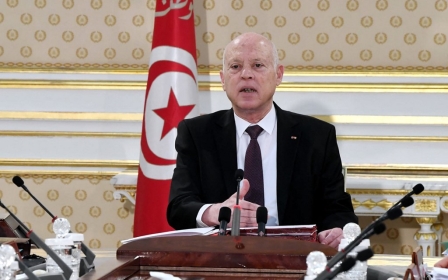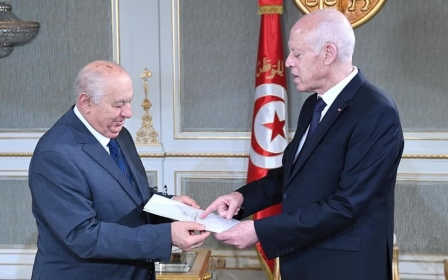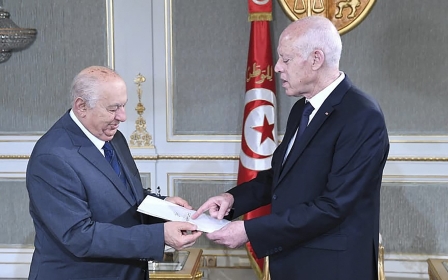Tunisia: Court freezes bank accounts of Ghannouchi and eight other Saied opponents
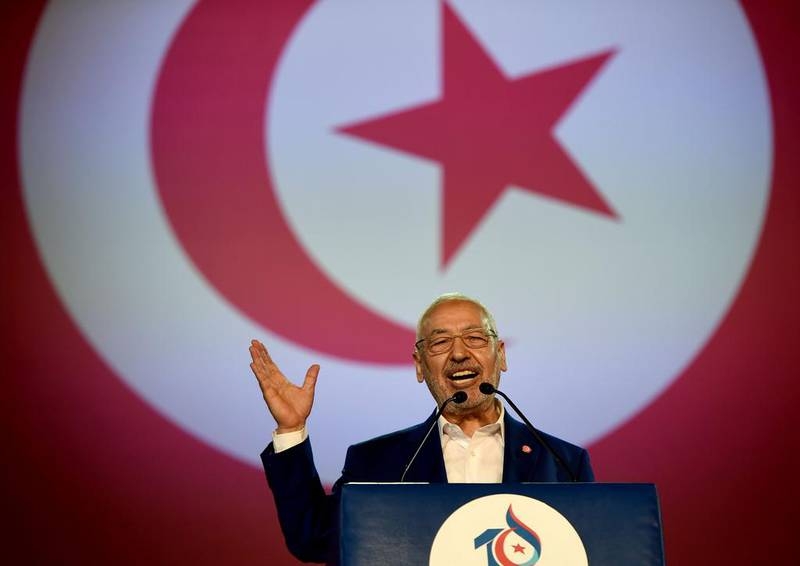
A Tunisian court has frozen the financial assets of several opponents of President Kais Saied, including the former speaker of the dissolved parliament, Rached Ghannouchi, and nine others.
The order issued on Wednesday also listed Ghannouchi's son, Moadh, former prime minister Hamadi Jebali and former foreign minister Rafik Abdessalem, all leading figures in the Ennahda party.
"There is an order from the anti-terrorism judge to freeze the bank accounts of those people and the Financial Analysis Committee asked the banks to implement the judicial decision," said an official on the Financial Analysis Committee, which is headed by the central bank governor.
Ghannouchi, who is Tunisia's main opposition leader, has become an outspoken critic of Saied since his power grab last year, in which he dismissed parliament and gave himself wide-ranging powers.
New MEE newsletter: Jerusalem Dispatch
Sign up to get the latest insights and analysis on Israel-Palestine, alongside Turkey Unpacked and other MEE newsletters
Last month there were reports that Ghannouchi was "officially charged with belonging to a terrorist organisation".
Ennahda confirmed that a judge has summoned their leader to answer questions about the allegations, which they have described as "distortion and fabrications".
Legal experts have raised questions about the independence of Tunisia's judiciary under Saied. Said Benarbia, director at the Geneva-based International Commission of Jurists, told Middle East Eye that Saied has "subordinated the judiciary to his political will" in a series of measures enacted since last summer, including the dissolution of the Supreme Judicial Council and a purge on judges. Last month, Saied fired 57 judges to "purify" the judiciary, accusing them of protecting "terrorists".
"By purging the judiciary from some of the very judges and prosecutors who refused to comply with his unlawful decrees and orders, President Saied has sent a chilling message to other judges who should act as a check on his abuses of power," said Benarbia.
"Under the current framework, the public will have little confidence that the judicial decisions targeting the president's opponents are based on the law and evidence, instead of political considerations," Benarbia added.
'Autocratic project'
In June, the former prime minister Hamadi Jebali, another of Saied's key rivals, was arrested on suspicion of money laundering and held for four days. Ennahda said his arrest was part of a campaign targeting government opponents.
It came just weeks before the Saied-endorsed constitution referendum, slated for 25 July, the first anniversary of Saied's power grab manoeuvres. The new constitution is seen as an attempt to reshape and consolidate the country under the "one-man rule".
"Only a small proportion of the society is supportive of the constitution," said Mohamed-Dhia Hammami, a Tunisian doctoral student in political science at the Maxwell School, Syracuse University.
"Saied is overselling it by claiming that it will fix all kinds of problems. Most people don't buy into his narrative," Hammami told MEE.
He added that the Tunisian president had embarked on an "autocratic project, with an unconventional form of popular representation he calls 'construction from the bottom'," which wouldn't succeed.
The country's powerful labour union, the UGTT, also recently warned that the draft constitution could threaten democracy, although it said its one million members can vote as they see fit.
'Saied knows that his proposed referendum and new constitution are very unpopular, so he's trying to divert attention and pretend he's fighting corruption'
- Radwan Masmoudi, Tunisia analyst
Saied's latest move against what was the largest party in parliament may also distract people from increasing economic woes and the lack of appetite for a new constitution, said Radwan Masmoudi, president of the Center for the Study of Islam & Democracy in Washington DC.
"Kais Saied knows that his proposed referendum and new constitution are very unpopular, so he's trying to divert attention and pretend he's fighting corruption, while at the same time going after the biggest opposition party in the country," Masmoudi told MEE.
"It is clear that Kais Saied is destroying the democratic experiment and institutions in Tunisia," said Masmoudi, adding that he wants to build an "authoritarian system where the president holds 80 to 90 percent of the levers of power.
"If he succeeds, Tunisia will see some very difficult and dark days, months and perhaps years ahead, especially in terms of human rights and freedom of expression and freedom of organisation," said Masmoudi.
This article is available in French on Middle East Eye French edition.
Middle East Eye delivers independent and unrivalled coverage and analysis of the Middle East, North Africa and beyond. To learn more about republishing this content and the associated fees, please fill out this form. More about MEE can be found here.


